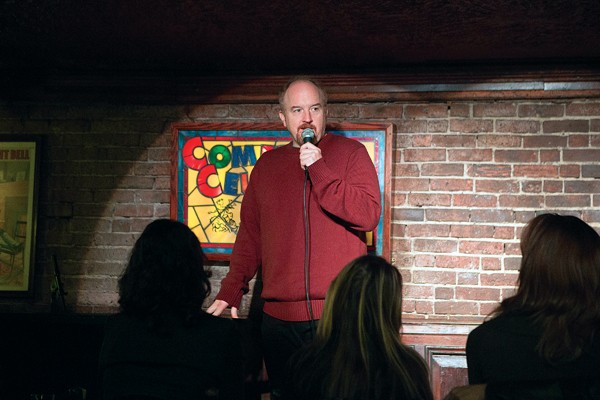“TV was (and to a lesser extent still is) fractal, with each individual episode standing in for the show as a totality. To tinker with the basic concept — like letting two battling lovers marry and have a child in the fourth season — is to destroy the delicate balance that keeps viewers tuning in.” — Ty Burr, Gods Like Us: On Movie Stardom and Modern Fame
“I said, ‘I won’t show you anything. You have to just wait until I’m finished with the shows.’ That was a very reckless thing to do, and [FX] could have said no, but if they had I would have just gone back to the road. But they said yes, so here I am.” — Louis C.K., interview with FilmSchoolRejects.com, June 28, 2010
FX’s Louie, which wraps its fourth season Monday night, stubbornly reinvents television every week. Like his creator, writer-director-editor-star Louis C.K., the Louie in Louie is a comedian and father of two girls. He’s eloquent onstage, but that telltale hand on the wall of the Comedy Cellar hints at other insecurities. At times, his failure to communicate grows so profound that he forsakes Newhart- or drops the Letterman-style stammering and falls mute. He spends a chunk of every episode sitting or standing silently and awaiting judgment; half of this season has explored Louie’s relationship with a Hungarian woman (Eszter Balint) who barely speaks English.

The hilarious Louis C.K.
Louie is a sad sack who trudges about his day like your uncle Marv. No belt can rescue his droopy jeans; no Beefy-T or XXL-sweater can hide his gut. He half-shuffles, half-lumbers into his scenes like a drunk or a grizzly bear that just got off the Tilt-A-Whirl. His gait is as expressive as Chaplin’s waddle, Tati’s tiptoe, or Keaton’s pit-bull charge.
In Louie‘s universe, things get weird fast. A tickle fight with an astronaut’s beautiful daughter winds up in the emergency room. A hurricane named after a Southern debutante kills LeBron James and demolishes Brooklyn in seconds. In flashbacks (or are they daydreams?) Louie’s black ex-wife suddenly turns white. His recalcitrant daughter suddenly cries out, “Why is there even an America?” A fat girl suddenly says “fuck” on network TV.
But things frequently slow to a crawl, too; the sense of time passing both quickly and slowly is reminiscent of those moments after an automobile accident. C.K.’s proclivity for long takes and shallow lenses prolong awkward moments, difficult conversations, and solipsistic reveries that explode in his face. In “So Did the Fat Lady” — one of the most extraordinary reckonings with female body-image issues I’ve ever seen — an awesome, overweight woman (Sarah Baker) takes Louie to task for his refusal to really see her. The camera circles them repeatedly but it won’t look away from her or from him when Louie tries to escape. That episode is the strongest example of Louie‘s bracingly surreal approach to storytelling, where the terrifying unpredictability of the next thing seen or the next thing said is the only constant.
I’ve never seen anything like it.
Louie
FX
Season 4 Finale, Monday, June 16th, 9 p.m.